Discover our informative blogs on mindfulness, trauma-informed care, mental health topics, and personal growth! We’ll be adding new posts regularly to keep you inspired!
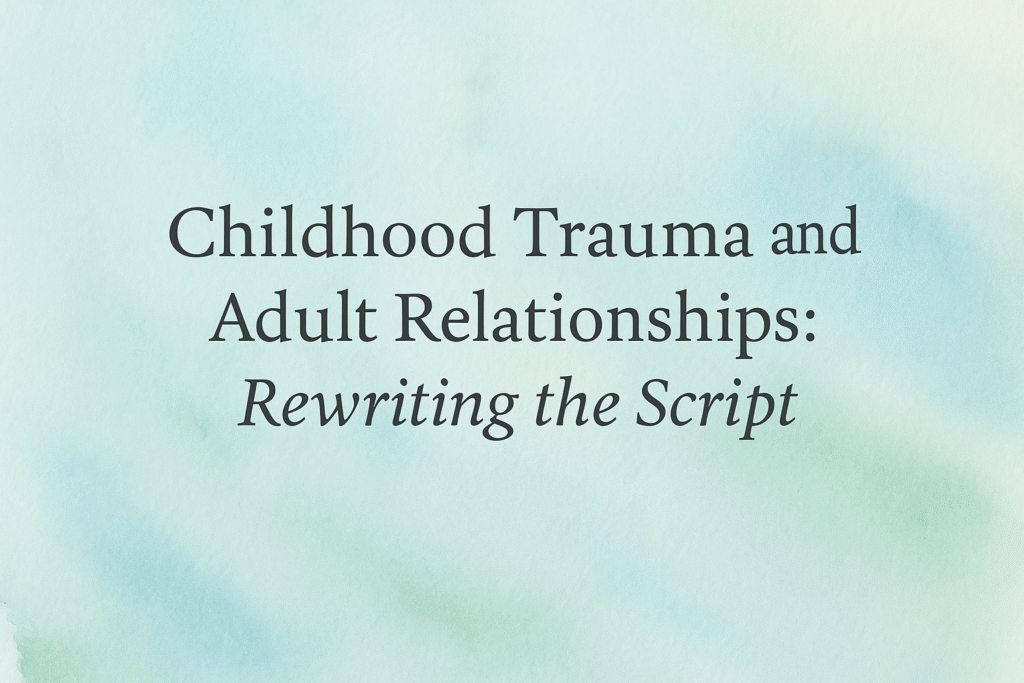
When the Past Speaks in the Present
A lot of us arrive in adulthood and figure we’d left our childhood behind. But the truth of the matter is that the body remembers what the mind tries to forget.
The way we attach, communicate, and respond to love is often an echo of the patterns we learned in our first relationships — particularly if those relationships were inconsistent, neglectful, or fearful.
A child who was doggedly trying to earn the love and affection of parents often becomes an adult who mistakes anxiety for emotional connection.
A child who was taught that love could vanish at any time may find adulthood spent bracing for the loss — even when the evidence of his eyes tells him that his loved one is still very much there.
These aren’t character flaws. They are defensive patterns, constructed for survival.
The Brain Science of Attachment and Trauma
The psychologists John Bowlby and Mary Ainsworth had developed the theory of attachment — how our earliest bonds formed will influence how we bond later in life. When early experiences in childhood involve emotional neglect, inconsistency, or trauma, the nervous system learns to be on guard instead of at ease.
As an adult, this could take the form of:
- Resistance to relying or trusting others
- Thought of not being worthy of love or fear of rejection
- Reading too much into an offhand tone or a shift in his focus
- Avoiding vulnerability or emotional intimacy
- Holding on very tightly to relationships for fear of abandonment.
The brain builds itself to keep us safe, not necessarily happy. Once safety meant being protected or hyperalert; it can require intentional effort to teach the body a new definition of love.
Overcoming: Changing a Script From Old to New
Healing from early trauma isn’t about expunging your past altogether — it’s about reclaiming authorship over your story. It is learning to identify when your nervous system is responding to them, and not now.
Here are some ways to start rewriting that script gently:
Observe only the Pattern, Not the Individual
When someone or something triggers you, take a moment before responding. Seek: Is this moment acting like something old? To give a name to the pattern is to break its spell.
Find Safety in Stillness
Grounding tools — a deep breath, extra-long exhale, body scan, or mindful journal prompts that allow you to notice footprints in the sand — regulate our nervous systems, reminding us we’re safe in the here and now.
Use Language That Heals.
Replace self-blame with self-compassion. Instead of “I’m too needy,” try “A part of me is needing reassurance right now because it didn’t always have it.”
Look for Relationships That Feel Safe, Not Just Familiar.
Sometimes, what appears to be “home” is not really that at all. Good love might feel uneventful — even boring — at first. That silence is not emptiness but safety.
Consider Trauma-Informed Therapy.
Modalities like EMDR, Internal Family Systems (IFS), or somatic experiencing clear the body’s store of memories and teach new emotional regulation.
The Healing Power of Connection
Trauma starts in disconnection, but healing occurs in connection.
When we tell the things that governed our lives — to a therapist, say, or a friend; when we, in Heaney’s words, lay ourselves open like books — we begin to change isolation into empathy. We start to understand that love can endure.
Safe relationships rewire the brain. Each time a person listens without judgment or offers steadiness as opposed to chaos, the nervous system learns a new truth: It’s safe for me to be seen.
A New Definition of Love
You can’t go back and offer your younger self the secure home you deserve — but you can be that home now.
Healing is not about finding someone to repair your past; it’s about learning to love yourself with the love you’ve always deserved.
“You’re not defective for defending yourself. You were brave enough to survive — and smart enough to learn a new way of loving.”1
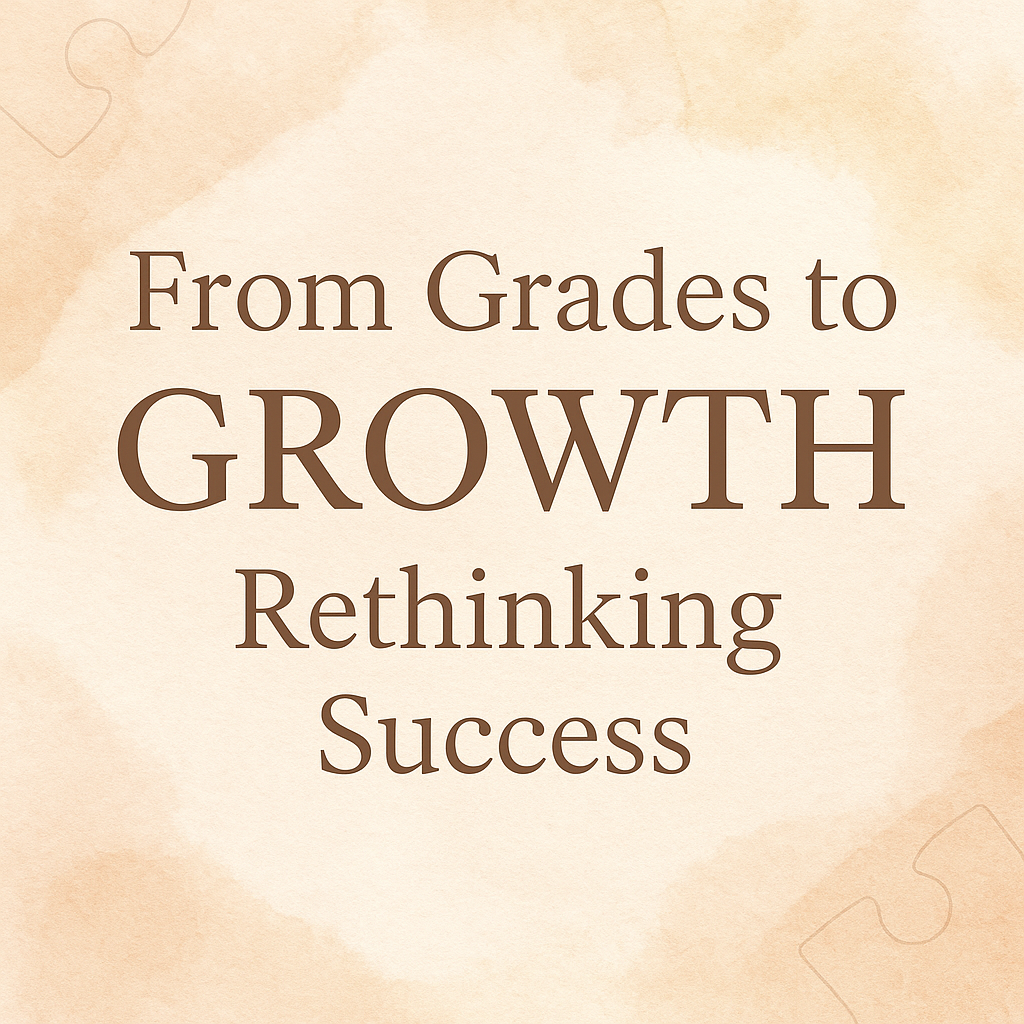
From Grades to Growth: The Case for Change Is Growing Stronger
Grades should never be about worth — only they are
For years, schools have measured success through letters and numbers, but not empathy or creativity — or, really, anything that doesn’t lend itself to a test score. What if the ultimate measure of learning isn’t how much students know, or whether they can excel in a particular course, but instead what they have gained from school that they can use throughout life?
The Dangers of the Grading Obsession
Grades can motivate — and they also can erode curiosity. When kids pursue A’s instead of knowledge, learning becomes transactional. Mistakes, necessary for brain growth, begin to appear as failures rather than valuable feedback.
Psychologist Carol Dweck’s work on the growth mindset serves as a poignant reminder that the brain is malleable — it can grow with effort, strategy, and support. When students believe they can grow, they pay closer attention to recover from setbacks, tackle tough challenges, and sustain motivation over the long term.
But for countless schoolchildren, the message is obscured by red marks and test anxiety.
Learning Beyond the Rubric
A child’s achievement is not always neatly recorded on paper.
Others are being taught how to regulate their emotions.
Others are beginning to speak out after decades of staying silent.
Some are working to rebuild confidence after trauma.
These transformations do not fit well into report card boxes, but they are critically important. Education is not only about learning facts and mastering skills, but also about cultivating oneself.
When that teacher also prizes reflection, collaboration, and curiosity, students learn that growth is not a race but a relationship — with themselves, with others, and with learning.
What Growth-Oriented Classrooms Look Like
A growth-based classroom is not about relaxing standards. It’s about broadening the very definition of what counts as success. Here is how that can play out in real life:
Celebrate Effort, Not Just Outcome
Rather than “What did you get?” ask, “What did you learn?”
Feedback is about effort, persistence, and creativity, not perfection.
Normalize Mistakes
Post a class motto: “Mistakes are data — not disasters.”
It informs teachers that when they model humility and self-reflection, students learn that mistakes are stepping stones — not verdicts.
Encourage Self-Reflection
Standard reflection journals or exit slips that allow students to take stock of their progress — emotionally, socially, and academically.
Diversify Assessment
Portfolios, projects, and peer feedback offer a more comprehensive picture of student growth than standardized tests can ever provide.
Prioritize Emotional Literacy
Support students in recognizing and labeling emotions during instruction. Cognition requires regulation; a peaceful brain is a learning brain.
When Teachers Grow, Kids Grow Too
Reframing success starts with us!
In doing so, they practice what they preach about lifelong learning, as learners are inherently curious and compassionate.
Students watch us navigate frustration, self-doubt, and imperfection.
A classroom in which both teacher and student are given room to grow — just that little bit slower, that much more imperfectly, so very realer — is a place of transformation.
Redefining Success
Success is not a number
It’s an attitude, a practice, and a commitment to change.
It is the courage to try again after failure, to think instead of running away, and finally to love learning for its own sake.2
When we teach for growth, not grades, we elevate more than just more brilliant students — we graduate stronger human beings.
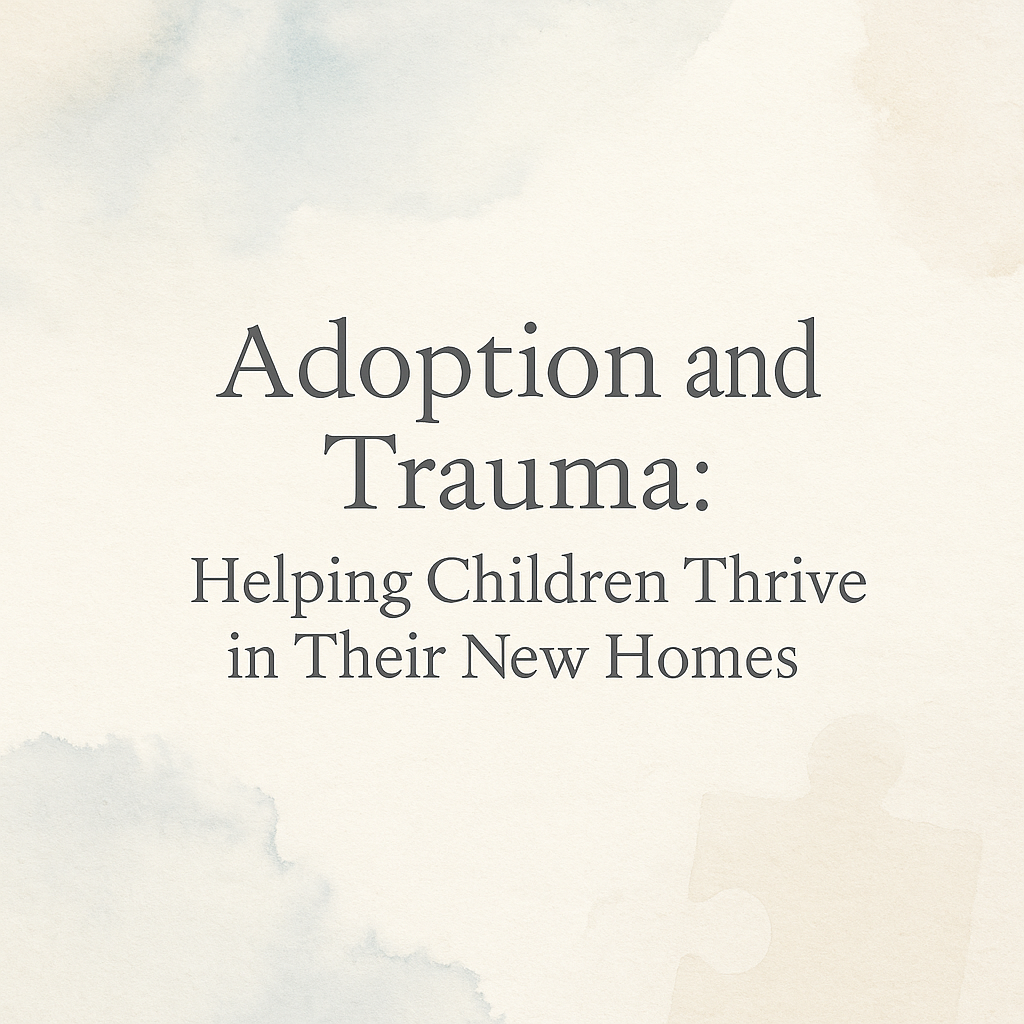
Adoption and Trauma: Helping Children Thrive in Their New Homes
Adoption is a gorgeous act of love — and for many children, it comes on the heels of loss, instability, or trauma. That’s because welcoming a child into a brand new home is about providing safety, attachment, and the possibility of healing. Learning how early experiences in life affect their emotions, behavior, and sense of identity can enable caregivers to lay the groundwork for durable success.
The Collateral Damage of a Traumatized Child
Children experiencing neglect, abuse, multiple placements, or institutional care often bear these invisible scars. These early experiences impact the developing brain and nervous system, influencing how children perceive the world and respond to stress.
They have trust issues, regulation and identity issues, not because they don’t want to deal with those things, but because it’s what having survived in such uncertain safety requires.
Common challenges may include:
- Attachment and trust–inability to bond securely or fear of abandonment.
- Self-regulation: Overreaction, withdrawal, or shut down
- Behavioral changes: Becoming more disruptive or defiant, testing the rules
- Cognitive attention issues: Problems focusing on or controlling statements or impulses
- Grief and loss: Identity confusion, sadness of separation, or fear of further losses.
These reactions are not indicators of “bad behavior.” Those are adaptation symptoms — the child’s protective behavior in a scary world.
What Trauma-Informed Parenting Looks Like
A trauma-informed, adoption-competent model uses safety, empathy, and connection as its core. It knows we heal in relationships, not alone.
Safety and Predictability
You cannot protect children from the fallout of cancer, but you can give them consistency, gentle boundaries, and clear expectations. Predictability builds trust. When life stabilizes, the nervous system can begin to settle.
Instead of focusing primarily on discipline, understand the need behind the behavior. Refocus on what you know is needed (rather than discipline) from the behavior.
Statements like “you seem to be feeling scared at this moment,” or “I know that what’s happening is difficult for you” convey understanding and safety.
Relationship overrules
Connection is healing’s foundation. One-on-one time, reciprocal play, and reparation after conflict all contribute to reopening the child’s basic trust that relationships can be safe and lasting things. Emotional regulation skills.
Model calm breathing, create quiet spaces, or engage in sensory grounding activities, such as squeezing a stress ball, touching something soft, or voicing what they see. Help kids learn that large feelings can be experienced without fear. Supportive treatment.
Therapeutic approaches to Trauma-Focused Cognitive Behavioral
Therapy or Dyadic Developmental Psychotherapy can help heal attachment and emotions for the provider. Choose a provider who is well-versed in both trauma and adoption. Honoring grief and identity * Even in the most loving adoptive homes, children may mourn their past. Let them discuss their birth parents, ask questions, or cry.
Their grief does not mean they are ungrateful; instead, it means they are working through various challenges. For transracial or transcultural adoptions, keep a connection to the child’s heritage through stories, community, and culture. The two worlds make them feel like they belong and help strengthen their sense of self.
Collaboration and Advocacy
Work with your child’s teachers, therapists, and other caregivers to ensure everyone is familiar with trauma-informed care. When a child is accepted across multiple environments, their permanence deepens. Care for the caregiver * Parenting children who have been wounded can be draining. Support groups, therapy, respite, and other resources are available.
When you see a child start laughing, accept comfort, or say ‘I love you’ without having to be afraid of something — that’s healing in motion. It can take time, months or years perhaps, but each small act of daily compassion slowly starts to repair the rupture that trauma created.
Because at the end of the day, adoption is more than just about providing a home.
It’s a matter of building a new home in the heart3
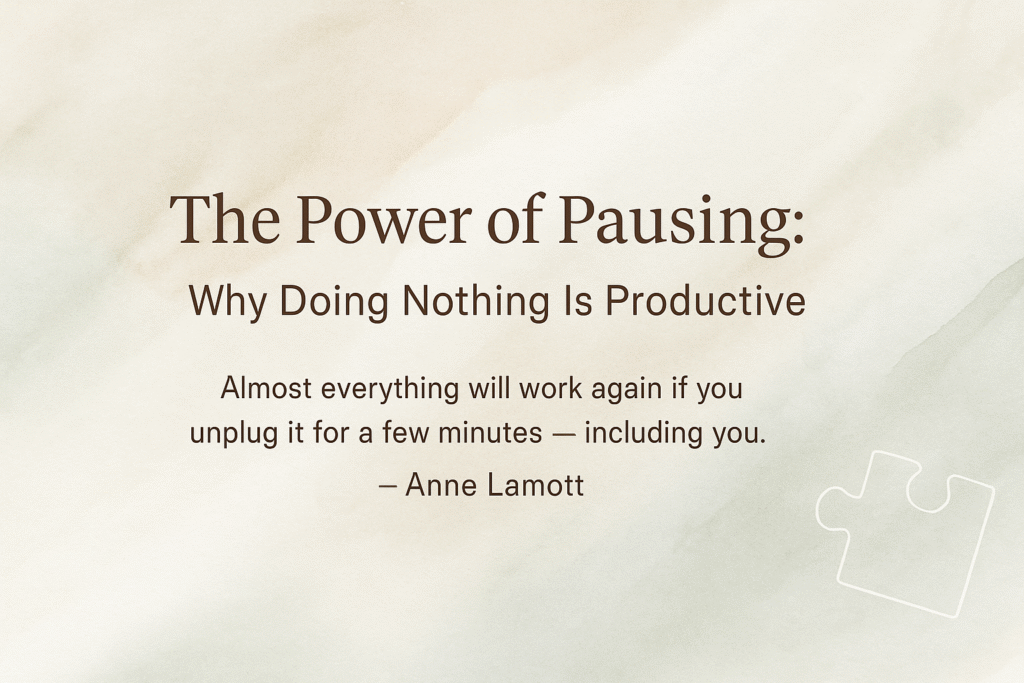
Busy as a Bee
We live in a busy culture. Ask anyone how they are, and you’ll hear it: “Just trying to keep up.” Busyness is our shared status symbol, a declaration of how important and valuable we believe ourselves to be. But underneath that surface hum of activity, many of us are quietly tired.
We interrupt every pause with something: a scroll, a response, a list of new things to accomplish. It feels uncomfortable, almost guilty — like we’re falling behind. But at heart, we all know better.
Every last airy molecule buried deep in our nervous systems yearns to decelerate, to breathe a little easier, to recall what it once felt like ‘to be’, without having to grow or deliver up the goods. That longing isn’t laziness. It’s a cry to re-balance — body, mind, and spirit.
What Happens When We Pause
When we stop, something exciting happens in the mind and body. The swollen river of doing subsides, and the deeper channels of consciousness begin to emerge. In silence, the brain can enter a state of introspection.
It is in these quiet moments that creativity begins to germinate, solutions present themselves, and we reconnect with what truly matters.
Physically, literally, and metaphorically, pausing invites the body to exhale. The heartbeat slows, the breath deepens, the muscles relax. Our system exits survival mode and enters restoration.
A few minutes of mindful stillness can remind the body and mind that it is safe to rest.
Nothingness, in fact, is not an inactive state. It’s what makes productivity possible.
The Myth of the Ever More Productive Worker
We’re conditioned to think that our value is based on what we get done. In school and at the office, we’re rewarded for speed, output, and multitasking. Rest, however, tends to be viewed as indulgent or undeserved.
But productivity without breaks is like running without air — eventually you keel over. The mind and body are not built to be rhythmless. Growth is a motion, and yet it is also the absence of motion; whereas the heart needs both constricting motion and releasing motion.
Real progress isn’t achieved by trying harder; it’s attained by knowing when to stop. It is those pauses between the strenuous effort where clarity, creativity, and healing are born.
The Restorative Mayhem of ‘Doing Noting’
“Doing nothing” doesn’t mean passively or negligently so. What it means is creating the space for awareness to be recovered.
- It’s taking a sip of coffee before you bother to check your phone.
- It’s sitting on the porch and feeling the morning sun hit your face.
- It’s as though one ear is listening through an assistant announcer while the other is out walking without earbuds or music, the only sound being that of both feet hitting the pavement.
- It’s permitting yourself to breathe — fully, deeply, unapologetically.
- These seemingly unassuming pauses allow for a wandering mind and an open heart.
They are where inspiration lurks, hoping to be found. Many of our best ideas come to us not when we force them to emerge, but when we stop trying altogether.
Healing Through Stillness
While many people find it awkward to be still at first, particularly when life has taught us that safety is found in movement, performance, and control, the pause is exactly where healing starts. Every time we stop, we teach our nervous system something different:
“You can rest now. You are safe here.”
Gradually, these small interludes of stillness recraft our relationship with stress. They dull the sharpness of anxiety and invite compassion back in; stillness is no longer something to fear but something to trust.
Pausing doesn’t make life’s chaos go away, but it gives us a chance to meet it differently — with steadiness, rather than strain.
Rest as Resistance
In a culture conditioned to equate fatigue with success, rest becomes an act of defiance.
To pause is to declare, I’m not going to judge my value by my productivity.
It’s about respecting the human need for rhythm — work and rest, inhale and exhale, effort and ease.
Rest is not giving up. It’s giving back — to your body, your creativity, your peace.
When we take time to slow down, suddenly everything becomes clear again. We remember that productivity is not the aim — presence is.
And in that presence, we refamiliarize ourselves with what really matters: laughter, connection, joy, wonder, and the miraculous inhale and exhale of breath.
Ways to easily practice the pause
Stillness is not something you need to spend hours cultivating during a silent retreat or through an elaborate meditation practice. Just start from where you are:
- Pause between tasks: Take a deep breath and let your shoulders relax before clicking over to a new tab or sending an email.
- Pause before reacting: When feelings surge, let them crash against you before responding.
- Pause outdoors: Venture outside, feel the air, gaze at the sky, and remember you are part of something so much bigger.
- Pause at transitions: Between home and work, between meetings, between jobs — breath, reset, let it go.
- Pause before sleep: Ask yourself, “What can I stop doing tonight so that I can rest fully?”
Each pause is a door back to yourself.
Reflection Prompt
What if I quit striving for just a moment — not from fear, but in faith that stillness has something to teach me?”
- Write about that.
- Draw it.
- Or sit with it.
You don’t need to fix or solve it — listen.
Closing Thought
Nothing is actually not, because you are doing it. It’s how we remember who we are after the noise quiets. When we stop, it allows the mind to rest; it creates a space for us to heal, both physically and emotionally, and provides a place where our soul can breathe.
So take a moment — right now — to do absolutely nothing.
The world will continue to exist while you’re gone.
But you will return to it softer, steadier, and more whole…4
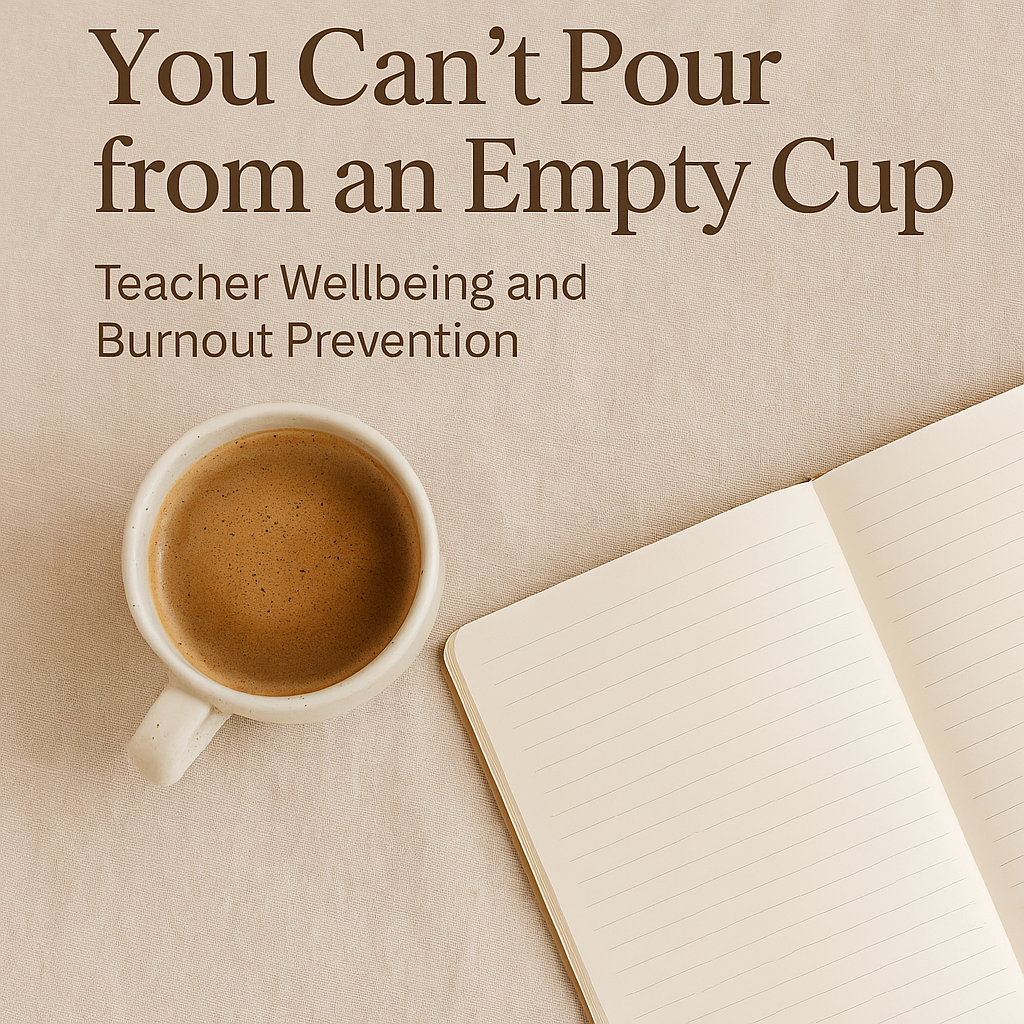
“Caring for myself is not self-indulgence, it is self-preservation, and that is an act of political warfare.” — Audre Lorde.
Introduction: The Hidden Load Teachers Bear
Teaching has always been a profession of the heart — of showing up, giving without end, and holding space for others. But today’s teachers are increasingly being asked to meet responsibilities that extend well beyond lesson plans and report cards. Amidst counseling emotional needs, test prep, and fluctuating classroom expectations, teachers often scrape the bottom of their own wells.
It isn’t personal failure; it’s a system outage. It informs us that a balance has been disrupted — between giving and receiving, between care and rest.
What Burnout Really Looks Like
According to the WHO (2019), burnout is composed of three dimensions:
- Exhaustion – feeling at the end of your rope and having no energy left.
- Depersonalization — a negative, cynical attitude toward students or work.
- Decrease in personal accomplishment – feeling powerless or incompetent.
Teachers’ burnout may manifest as irritability, a lack of motivation, regular illness, or an inability to find joy in a profession that once inspired them. Studies have demonstrated that chronic stress does more than affect mental health; it also interferes with a teacher’s ability to be effective in the classroom and their ability to demonstrate empathy —characteristics that we instinctively attribute to educators.
The Science of Stress and Self-Compassion
Teachers can be strict about taking care of themselves. But brain science indicates that chronic activation of the stress response can lead to emotional depletion and reduced cognitive flexibility.
Mindfulness and self-compassion, in contrast, engage the emotional regulation and empathetic regions of the brain. Through present-moment awareness, teachers learn to reduce feelings of physiological stress and reclaim a sense of clarity during times of overwhelm.
Simple daily routines — perhaps mindful breathing between classes, gentle stretching, or even just a minute of conscious stillness — can help start to reset the nervous system.
Strategies for Teacher Wellbeing
Stand Up for Oneself — and Don’t Forget It.
It’s cool to say no. Boundaries defend energy and turn “yes” moments into more meaningful things. Set digital cut-off times and guard personal time.
Practice Self-Compassion, Not Perfection
Teaching is relational, not mechanical. Failing and having hard days and messy learning experiences are just that —growing pains. Be as kind to yourself as you are to your students.
Build Rest into Routine
Micro-rests throughout the day — such as taking a mindful breath before class, stepping outside for sunlight, or a quick two-minute journaling session — indicate to the body that it is safe enough to take a break.
Connect with Colleagues
Isolation deepens burnout. To read others’ words of struggle helps to normalize and encourage mutual support. Community is one of the best stress busters.
Reconnect with Purpose
Remind yourself of what initially attracted you to teaching. Think about those times — whether large, small, or somewhere in between — when you saw a light switch on for your students. In the face of waning motivation, memories like these are powerfully anchoring.
Cultivating a Culture of Care
Real teacher wellness will have to be more than just personal self-care; it will involve systemic compassion in schools, where we not only take care of ourselves but also recognize the importance of caring for others.
Administrators can also make a big difference by:
- Infusing mindfulness and SEL into staff meetings
- Encouraging professional boundaries.
- Acknowledging emotional labor as work of teaching load.
- Providing wellness days and mental health resources.
- When schools treat teachers as whole human beings, they also model the same empathy and respect they seek to instill in their students.
Closing Reflection
Teachers spread light every day — sometimes without any idea just how much of their own they are sharing. The reality is, to rest is not indulgent; it’s imperative. When teachers take care of themselves, they preserve the heart of education: connection, creativity, and compassion.56
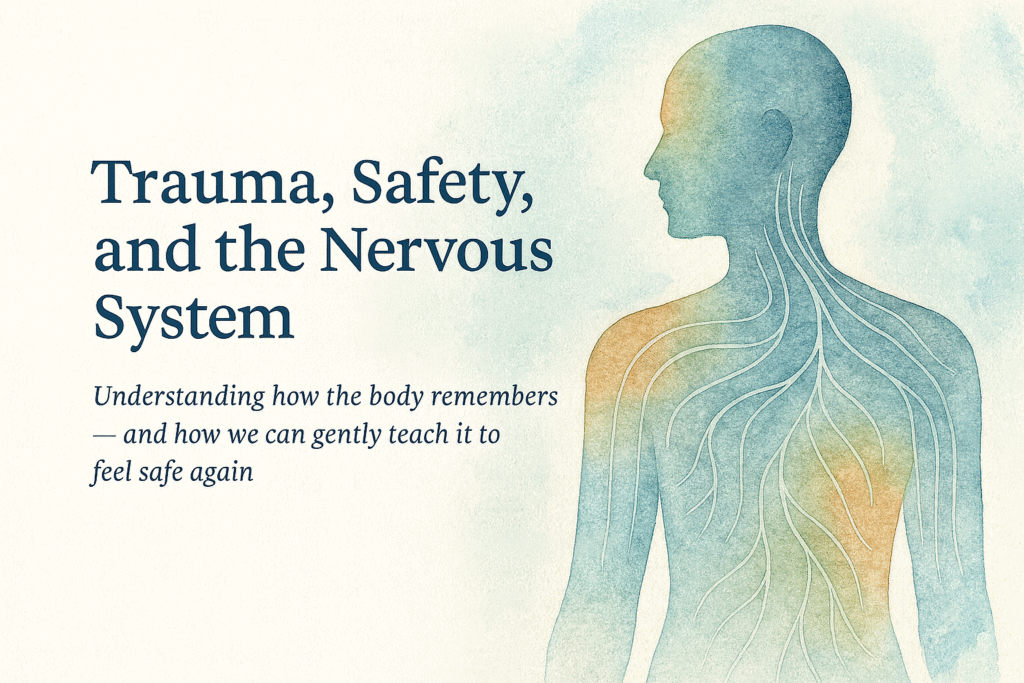
Introduction: When the Body Remembers
Trauma doesn’t exist just in our heads — it is housed inside of us. When something terrible happens, the nervous system makes a choice long before our thoughts have had a chance to rally: survive now, process later. And sometimes, “later” never comes.
The body stays alert. The heart beats fast at the sharp sounds—the stomach knots when you’re in crowded rooms. Years later, our system might still behave as if danger exists — because that’s how it was trained to protect us.
This is not a weakness. It’s biology. Admitting that is the first step toward healing.
The Science of Survival: The Body, the Brain, and Trauma
When we perceive danger, the ANS triggers fight, flight, freeze, or fawn reactions:
- Struggle — the desire to defend or push back.
- Flight: the impulse to flee or escape.
- Freeze — the sensation of locking up, of going numb.
- Fawn — flattering or pleasing others; for a powdered wig, also to remain unharmed.
These are survival instincts — not decisions. With cumulative trauma, the ANS can become ‘stuck’ in either an overcharged hyperarousal state (fight/flight) or a shutdown hypoarousal (freeze/play dead) state. It’s why survivors of trauma might also grapple with chronic anxiety, fatigue, numbness, or emotional regulation problems.
The Healing As Safety Grounding
Healing begins when safety returns. But safety is not just about being protected from harm — it’s about feeling safe in one’s own body.
Since you are a goddess at heart, you may have failed to realize it, but your nervous system is constantly on the lookout for indicators of friend or foe. This process — known as neuroception — occurs unconsciously and affects how we relate to, communicate with, and respond to one another.
We can start to regain that sense of safety in the following three ways:
- Immersing ourselves in calm, steady presences.
- Creating predictability in our routines.
- Hearing what the body is saying without judging it.
- Giving ourselves compassion and not criticism.
- Healing can occur when the body learns to know that now is not then.
Regulation Practices: Teaching the Body to Calm
And healing the nervous system has less to do with “thinking our way through” trauma and more to do with being safe in real time. Here are a few common, evidence-based strategies to help with regulation:
1) Grounding Through the Senses
Find three things you can see, two you can touch, and one you can hear. These awareness exercises help bring you back to the present moment.
2) Slow, Rhythmic Breathing
Breathe in through your nose for four, out through your mouth for six. Longer exhalations activate the vagus nerve, which tells your body to calm down.
3) Gentle Movement
Walk, stretch, or sway. Movement allows for stored-up tension to be released and provides safety through rhythm.
4) Creative Expression
Write, paint, or play music. “Expression is the body language for what you can’t always reach with words.
5) Weighted or Comforting Touch
Bundle up in a blanket and hold a warm mug or a weighted pillow. Physical reassurance can help restore that sense of safety and connection.
Closing Thoughts: Survival to Presence
Your nervous system has had one job, and in terms of survivability, it’s done that job magnificently. Now, the antibiotic of healing requires teaching it that it no longer has to fight every second to protect you.
Safety, empathy, and connection reeled the paths trauma had once hijacked. The body, through breath and awareness – soft presence even – begins to whisper the truth: “I’m safe now. I can rest.”
Reflection Prompt
Think about writing and reflection on art here. Observe, rather than judge, how your body reacts to comfort, tension, or relaxation throughout the day. 7
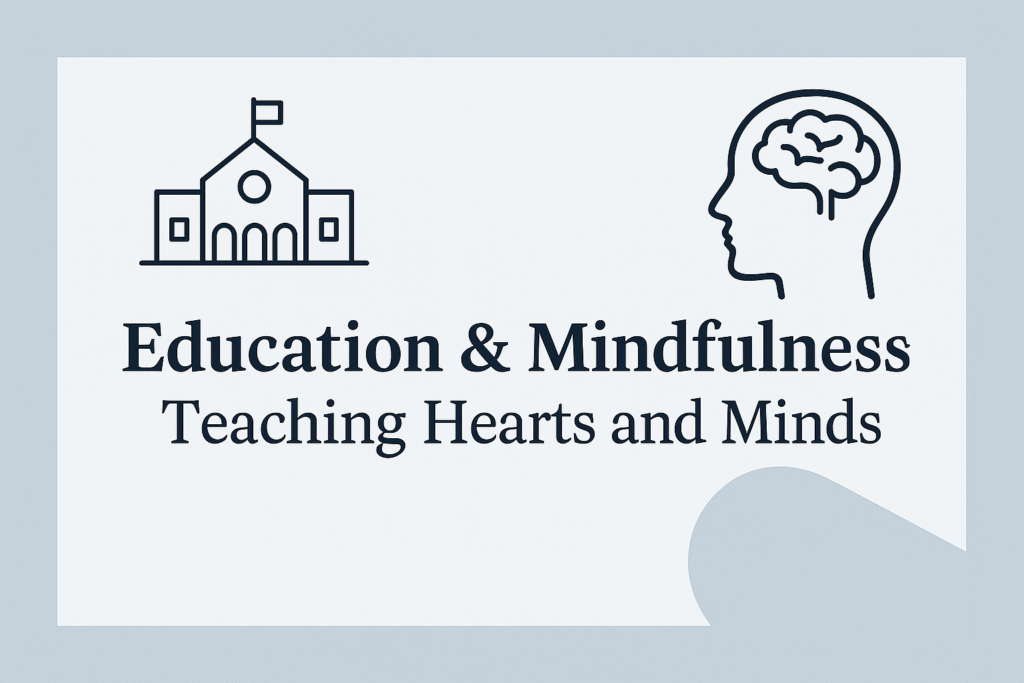
Learning and Mindfulness: Educating Hearts and Minds
In our ever-changing, tension-filled world, schools are more than institutions of academic learning—they also serve as places for children to develop socially and emotionally.
As educators, caregivers, and community members, we are not only tasked with teaching math and reading but also with fostering resilience, empathy, focus, and self-awareness. One of the most potent tools we possess for this work is mindfulness.
What Is Mindfulness, And Why Should Your Students Be Using It in Your Class?
At the heart of mindfulness is paying purposeful attention to the present without judgment. It instructs students to be attentive toward their thoughts, feelings, and environment, with curiosity and compassion. Studies have shown that brief daily mindfulness practices can help improve attention, reduce stress, and enhance emotional regulation in children and adolescents.
Mindfulness is no longer just a mental exercise; when it’s practiced in the classroom, it becomes a life skill. Students are taught to pause before reacting, to recognize and label their emotions, and to refocus their wandering attention repeatedly. These are not just beneficial for learning in the classroom but also enhance our social relationships, encourage empathy, and develop our emotional resilience.
Building Trauma-Informed, Mindful Classrooms
A lot of students come into the classroom with invisible weights on their shoulders — from anxiety and grief to trauma and chronic stress. Traditional teaching methods often overlook the impact of these experiences on learning, behavior, and memory. A trauma-informed, mindfulness-based approach shifts the focus from “What’s wrong with you? to “What did you tell us about what happened to you — and how can we help?”
Safe, connected, and emotionally intelligent, with a mindful classroom approach in mind.
Simple rituals like taking deep breaths before a test, engaging in mindful listening during group discussions, or gratitude journaling have the power to downregulate the nervous system and create an environment for deeper learning. These are the strategies that make room for healing and growth — transforming classrooms into sanctuaries of safety, instead of adding to our stress.
Teach Like the Zen Master You Are: How to Incorporate Mindfulness into Your Classroom
Begin the day with grounding: A two-minute breathing exercise or moment of silence to help students connect mentally and emotionally before they get underway.
Mindful journaling: Encourages reflection on feelings, experiences or even lists of gratitude to develop emotional and language literacy.
Time for creativity: Art, music, and movement can also offer mindfulness practices for stress reduction and emotional healing.
Pause moments: Students learn to reset their focus and still their bodies with brief, mindfulness pauses before transitions or tests.
A New Vision for Education
Education is more than what we know — education is also about who we become. When we bake mindfulness into the very fabric of education, we teach young people far more than how to treat numbers or what happened on this day in history — we deliver them the tools to learn with purpose, act with unshakable compassion, and see clearly that which blurs so many.
We cultivate strong hearts as well as push bright minds.
When classrooms take mindfulness to heart, students start to feel visible, capable, and supported — not just for academic gains, but as thinkers who can thrive in the world.8
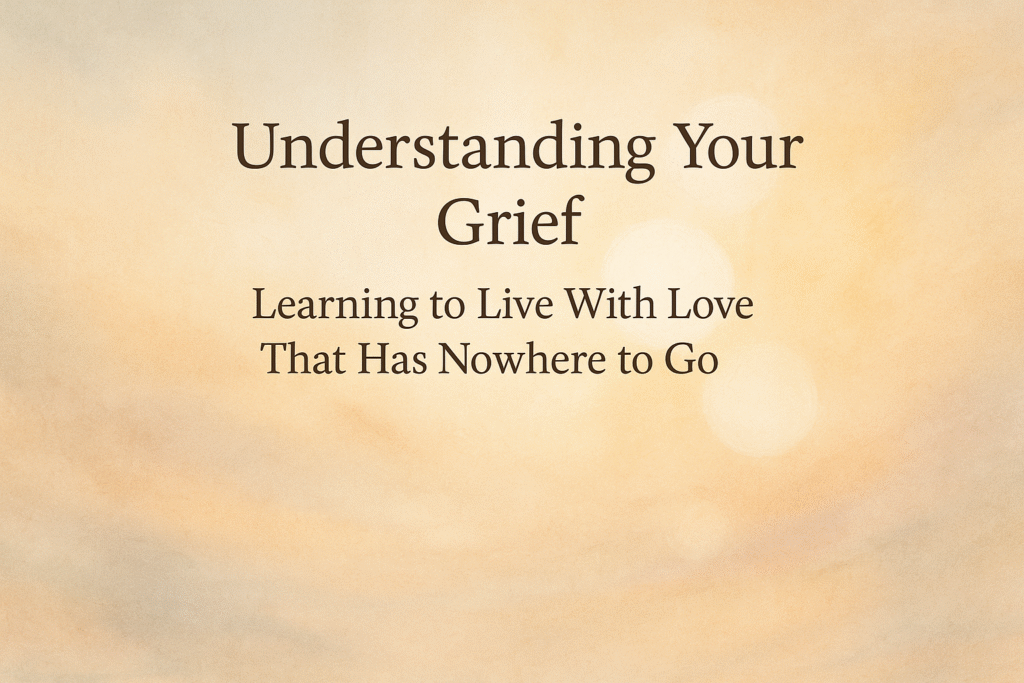
Grief, heavy as it is, is the proof that love was — and still is. It lingers, reshaped, not gone. And days pass, and that love starts to weave through who you are becoming. You will laugh again. You will hope again. And if the heartache never really goes away, it will fade enough to be a presence you can bear — a reminder that even in loss, love endures.
Grief is not one emotion. It’s a storm — abstract, unpredictable, and achingly personal. For a moment, you are laughing at a memory; the next moment, you can hardly breathe as sobs grip your body. It is not a tidy box with a bow on it, and there are no checklists, timelines, or magic bullets to take the pain away overnight. No, what matters most is this: There is no “right” way to grieve.
Being made to feel as though we’re supposed to fit into someone else’s idea of what grief should look like only adds layers of guilt and shame, heaping more emotional schlep onto an already difficult road. For many of us, grief is born out of loss — and there are many forms that loss can take.
The Loss of a Loved One
When somebody you love — a parent, a sibling, a friend, a grandparent, or even a pet — dies, your world can feel like it has shifted under your feet. The sadness is all-encompassing, a high wall seeming impossible to climb. Your world has changed in ways you cannot yet comprehend, and confusion may not be far behind.
The Loss of a Relationship
Grief isn’t always about death. The pangs can be prolonged over the end of a friendship or an estranged family. Betrayal, abandonment, and rejection make you feel alone and out of place. That emptiness fills the silence in your life daily, hourly, all the time.
The Loss of a Pet
Pets aren’t just animals; they are family. The silence of their absence is deafening. The sight of their bed empty, their playful energy vanished, can crush your soul in ways words don’t convey.
The Loss of a Dream or Future
Sometimes what we mourn is not a person, but the possibility —a dream unfulfilled, a future forever altered from the one we once hoped would be ours. Whether as a result of illness/life change/sudden change in life’s circumstances, these losses have their own form of disorientation and sadness. The uncertainty of “what now?” can seem heavier than the loss.
The Emotional Landscape of Grief
Grief is not linear. It’s a stormy cocktail of feelings that ebb and flow primarily without warning. Some days you seem to experience emotions one at a time; on others, they all smash into you at once.
Sadness
A dull pain that rests heavily on your chest. It makes you yearn for the way things used to be, and it leaves you depleted.” That sadness comes and goes: It can feel dull and constant one moment, sharp and overwhelming the next.
Anger
Anger frequently lurks underneath grief — at the situation, at yourself or others, even at the universe. It’s a response to being rendered helpless, to the unfairness of loss. Rage can be loud and volcanic or quiet, simmering rage is a natural part of mourning.
Guilt
Guilt hovers silently, enfolding your grief. It keeps hitting replay on “what if” and “if only.” We beat ourselves up for what we didn’t say or do, even if it wasn’t within our power. This cycle can hinder healing, but it is not inevitable, and just learning its name is the first step to breaking its hold.
Confusion
Grief disorients. It turns everything into a mess and burdens you with weariness. “Why?” sounds as a constant refrain, but is the one seldom given any answers. This confusion is not a weakness — it’s part of your mind trying to sort and understand something that makes no sense.
Denial
Denial is a comfortable, protective covering that protects us from pain — until reality intrudes. It affords us time to catch our breath and comprehend the unfathomable, but sooner or later, the other shoe will drop. Only when we slowly peel back that layer and face our loss does healing actually begin.
The so-called “stages” of grief are not steps on a ladder. They’re even more like a dance — chaotic, unpredictable, and deeply human. You could cycle multiple times between anger and acceptance in a single day. You may find deep sadness and ephemeral peace in the same breath.
Finding Your Way Forward
Grief isn’t so much a valley as a winding road with switchbacks you never see coming. Some days will feel hopeless. On the downside, others will provide jarring moments of quiet. Along the way, you might find fresh layers of yourself that you hadn’t known existed previously. The most important thing: be so, so kind to yourself.
Let yourself cry, scream, or sit quietly. Let yourself feel without judgment. Seek support when you need it — from friends, family members, or professionals. Healing doesn’t mean forgetting. It is about integrating your loss into your life story, learning to carry it with you rather than allowing it to define you.9
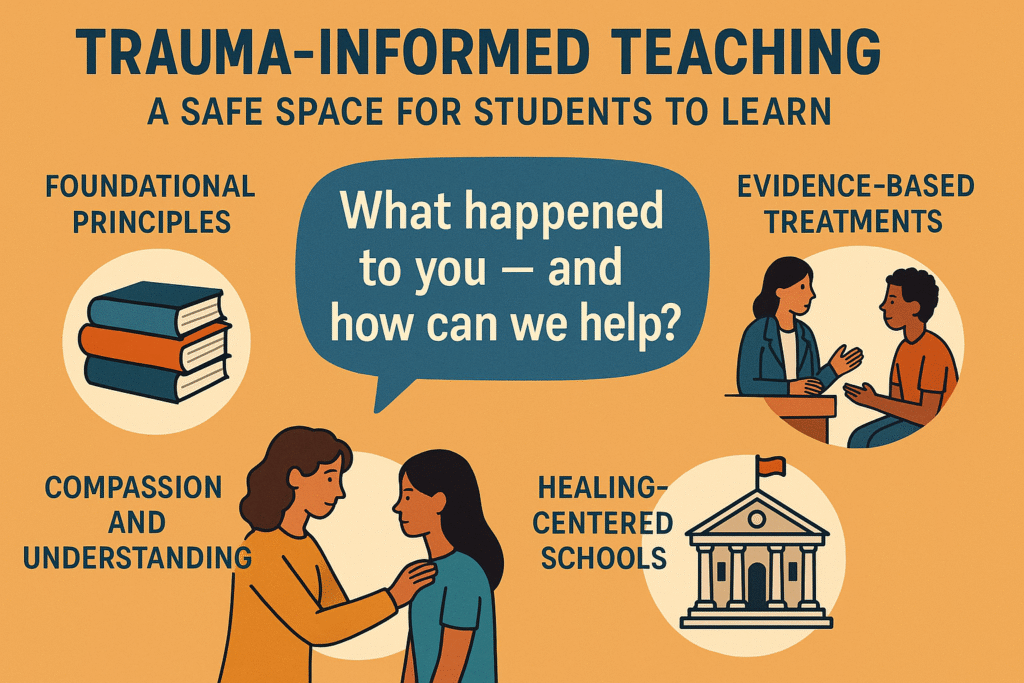
Trauma-Informed Care in Education: Healing the Classrooms
Find out how trauma-informed teaching can turn your classroom into a safe space for students to learn. Among the foundational principles, evidence-based treatments, and scientific underpinnings of healing-centered schools, educators will also explore how, in the academy, they will provide pupils with compassion and understanding, and will recommend this approach as the preferred course of action. By recontextualizing our question and approach to students from “What is wrong with you?” “What happened to you — and how can we help?” We can transform our classrooms into places of knowledge and growth.
What is Trauma and How Does It Affect Learning?
Trauma doesn’t necessarily come from big events; it can also stem from smaller, chronic stressors like childhood neglect, domestic violence, community strife, or poverty. (One expert told me that when people stay in fight-or-flight mode, their brain becomes super alert and they are stuck being ready to react.) In these moments, the thinking part of the brain doesn’t have a chance to intervene.
This can make it hard to avoid a series of consequences, like feeling frustrated or struggling to understand what’s being taught. Individuals may become overly sensitive to the actions of others or struggle to trust adults and form meaningful connections with them. Occasionally, what appears to be defiance or withdrawal in adults is actually a reaction to past experiences — it’s their nervous system’s way of dealing with what seems like a threat. Recognizing this can help us view these behaviors less as “misbehavior” and more as a manifestation of survival instincts.
The Essence of Trauma-Informed Care
It’s not a curriculum – trauma-informed education is about adopting a mindset that guides everything you do and every decision you make, from your day-to-day approach to the routines that underpin organizational culture. Based on several guiding principles, such as:
Safety — Physical and Emotional
No child can get an education unless they are safe. Classrooms must be predictable places of routine, not war zones full of stress and confrontation — or at least a milieu that eases tension rather than adds to it. These also communicate safety, however slight it may be, such as daily greetings and assigned quiet corners.
Trustworthiness and Transparency
Consistency builds trust. When educators are clear in their choices, follow through with what they promise, and react in consistent ways, children learn that the adults around them can be relied on to keep them safe — a fundamental foundation for healing.
Empowerment and Voice
Trauma has a way of leaving children feeling out of control. Providing choice, eliciting voice, and promoting self-advocacy can help students regain control and regain confidence.
Connection and Relationships
Resilience is built on a relationship. If everything else around you is falling apart, a single caring adult can be an incredibly powerful buffer to trauma. Small acts — such as attentively listening, inquiring about feelings, and affirming small successes — can have a lasting impact.
Cultural Humility and Responsiveness
All trauma is filtered through cultural and social contexts. All those who are caring need to appreciate and respect other identities, experiences, and histories if care is going to be offered in such a way that everyone can readily access and respond to it.
Practical Strategies for the Classroom
Putting trauma-informed practice into action is bringing these principles to life in your everyday work. Here are some small, mindful steps educators can take:
Create routine and predictability: Visual schedules, consistent daily routines, and forewarning before a schedule change reduce anxiety.
Teach regulation: Discuss adding mindfulness breaks, breathing exercises, or grounding activities to the school day.
Change the language: Instead of using words that create a sense of shame and judgment (such as “What’s wrong with you?” or “You’re ruining your life!”), use words that bring about feelings of love and compassion (“I can tell this is not how you want to be” — assuming, in fact, this is true — “and I believe in you.”) and positive ones like, “I see you’re upset — what can I do?”
This is all about relationships: Regular check-ins, individual feedback, and proactive conversations are your passport to trust and safety.
Collaborate on solutions: Involve students in setting goals, solving problems, and developing coping strategies. Empowerment fosters healing.
Not only does that kind of practice support students in the aftermath of trauma, but it also creates a significantly more humane and productive learning environment for all students.
A Culture Change: Moving Beyond One Classroom
Trauma-informed education that is effective isn’t the responsibility of individual teachers; it’s a whole school approach. Schools can embed such a model in their culture by:
Training all staff — from teachers to bus drivers — in the practice of trauma-informed care.Incorporating social and emotional learning (SEL) into curricular programs.
Rely on Families and Community Mental Health Providers
Between the lines: A trauma-informed approach to discipline policies
As trauma-informed care takes root in a school, classrooms become more than just classrooms; they’re sanctuaries for healing and growth—no longer regimented rooms confined to instruction.
Final Thoughts
Healing Happens here! Trauma does not define a child’s potential. A well-supported and prepared student can excel academically, socially, and emotionally. These are baby steps of understanding, tiny acts of constancy or kindness that help make every school a place where kids feel safe and looked after enough to actually learn. Because the classroom is where we heal, and it’s also where healing starts.1011
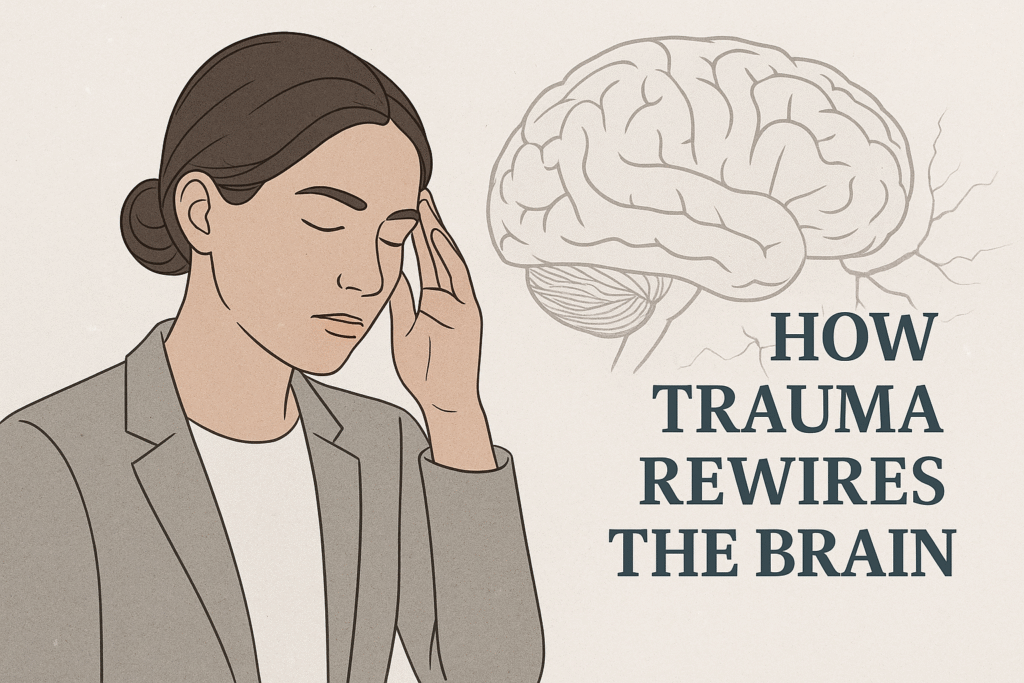
How Trauma Rewires the Brain: Science Behind Emotional Healing
Trauma isn’t just an emotional scar — it’s a deep wound in the brain, too. From rewiring our processing of danger to changing the chemistry of mood and motivation, trauma changes how we inhabit the world on a biological level. Acknowledging these changes is the first step toward moving forward with compassion, clarity, and the science on our side.
Trauma Is Much More Than a Memory
When we think of trauma, we may think of painful memories. But trauma isn’t simply something that happened — it’s something that happens to the brain. But too-powerful experiences, like abuse or loss or violence, can wire our systems to run differently. These transformations involve how we think, feel, respond to stress, and connect with others.
They’re not weaknesses! They’re survival mechanisms. But when those survival responses stay “on” long after the danger is gone, they can heavily influence how we live our lives day to day.
The Amygdala: Your brain on fear!
Playing a starring role in that threat response is the amygdala — commonly referred to as the brain’s “fear center.” It’s supposed to sound the alarm and trigger your body’s fight-or-flight defenses.
After a trauma has occurred, the amygdala becomes hypersensitive and sounds alarms even when there’s no actual threat. This over-activation can lead to:
- Persistent anxiety and hypervigilance
- Exaggerated startle responses
- Difficulty distinguishing safety from danger
A capacity for adrenaline that protected you in emergency can now fill your system with fear during even the quietest moments — and leave you on edge or exhausted.
The Hippocampus: Memory and Meaning
The hippocampus, which sorts and records memory and context — where, when, and how an event occurs — also changes significantly during trauma as well afterward. Dysfunction or disruption here can result in:
- Fragmented, intrusive memories
- Flashbacks that are like being there again
- Trouble distinguishing “then” from “now”
If the hippocampus falters, the brain’s “off switch” for stress can short-circuit. This is how the body stays in survival mode even when there’s no danger present, and the past feels like it’s happening now.
The HPA Axis: Engine Of Stress
The HPA axis is the central part of the stress response. In trauma, it does so by releasing cortisol and adrenaline — hormons that get the body ready to fight, flee or freeze. In the short term, such a response is survival-essential. But when the trauma is protracted or repeated (and in severe adult-case scenarios), this system can become chronically overactive, resulting in:
Chronic exposure to cortisol harms regions of the brain that store memory powers. A body that never stands down from fight or flight. Increased anxiety, emotional dysregulation, and even physical health problems. This biological loop runs itself, making it more difficult for the body and mind to return to relative calm.
The Prefrontal Cortex: Self-Regulation and Sense Making
The prefrontal cortex (PFC), your decision-making, planning, and emotional-control center in the brain, also changes after trauma. Shrinking or attenuating it. The more you use the limbic system, the bigger this muscle gets. The smaller the amygdala becomes, because it can atrophy; does that.
This can lead to:
- It leads to impulsive responses and trouble managing emotions.
- Trouble focusing or making decisions
- Imagine being less able to think straight when you hit that pressure point
Just as “putting the brakes” on an alarm system can become difficult, however, when the prefrontal cortex has to play this role toward the amygdala — which must be suppressed to keep emotions manageable — it is not just during extreme life-threatening moments that reasoning can start to feel tough.
Neurochemistry: The Mood Shapers
Trauma doesn’t just change the structure of our brains — it changes the chemistry. Core neurotransmitters like dopamine, serotonin, and norepinephrine — which influence mood, motivation, and emotional equilibrium — can go haywire.
This can manifest as:
- Changes in motivation; inability to experience pleasure
- Ongoing sadness or an inability to experience emotion
- Little or no enjoyment in things that you once found fun or interesting
They are not matters of character or willpower but changes that have taken place in the body as a result of overwhelming experience.
The Takeaway: Recovery Is Real
These are normal reactions of the brain to trauma and signs of weakness. They are the brain’s adaptive attempt to keep us safe in response to a terrible threat.
The good news:
- The brain is resilient.
- With therapy, mindfulness, and a connection to other people who care, combined with trauma-informed care, it can rewire and heal.
- With time and attention, what was once wired in fear can be rewired in safety and connection.
You, too, have the right to know how your brain and body are impacted by trauma. Knowing the neuroscience of trauma frees you up to heal from it with compassion, patience, and tactics that are evidence-based. When we recognize that trauma is biology, not a moral failing, it becomes much, much easier to understand that we don’t lack the willpower or courage to heal its aftermath.12
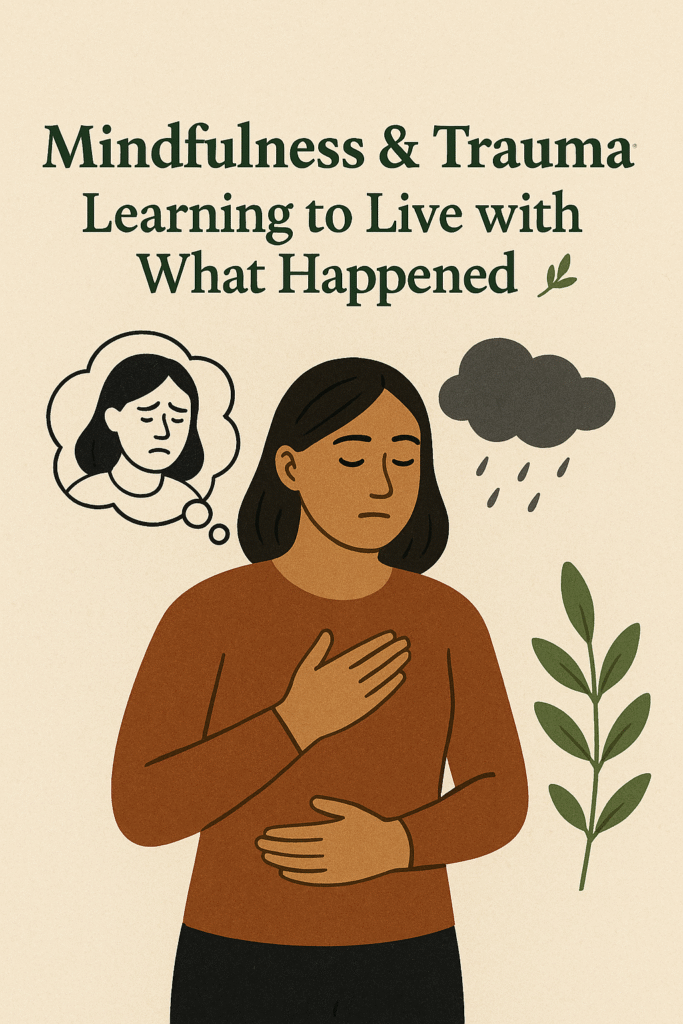
Mindfulness & Trauma
It’s natural to feel anxious about the prospect of catastrophic events exacerbating the hardships we’ve faced so far. Trauma, of course, is frequently layered — one wound upon another to form something akin to the way we see ourselves and how we move through the world around us. This residual anxiety is not limited to the way we think and feel; it impacts our self-image, our relationships with others, and even how our nervous system functions from day to day.
Healing from trauma is not about bootstrapping one’s way through or making believe it never happened. What healing doesn’t mean is some mystical metamorphosis that makes everything better, a fixing of the wound that returns us to exactly who we were before whatever happened — and whoever caused it. One of the most effective ways to support this transformation is by practicing mindfulness.
Trauma Lives in the Body
We almost always house the imprint of trauma in our bodies long after the event has passed. The ancient fight-or-flight response — which evolved to help protect us when danger loomed — can fail to switch off when the threat has passed. This activation itself can become continuous and lead to the experience of flashbacks, hypervigilance, perpetually tense muscles, or chronic pain.
Brain and trauma specialist Bessel van der Kolk says the mind/body relationship is simple: “The body keeps the score. Trauma isn’t just a psychological wound; it’s a physical one, too. Its effects are embedded in our tissues, our posture, our breath, and even how our organs function. And this bodily memory can make the business of healing feel heady and debilitating.
To feel safe and balanced again, it’s important to understand that trauma affects not just your mind but also your body. Recognizing this can help change feelings of guilt into self-compassion and lead to deeper healing.
Mindfulness: The Art of Being Present
Mindfulness is all about being aware of the present moment. You don’t have to forget about the past; instead, mindfulness helps you see it in a new light. When you approach your thoughts, feelings, and body sensations with curiosity and kindness, rather than fear or avoidance, it creates room for healing and growth.
Studies have repeatedly demonstrated that mindfulness practice can decrease post-traumatic symptomology, decrease anxiety, and improve emotional regulation. Even modest practices like paying attention to the breath, grounding ourselves in physical sensations, or tenderly, nonjudgmentally naming our emotions as they surface can help alter how trauma sits inside us.
These little moments of awareness, practiced repeatedly, accumulate to create our ability to stay present even when the echoes of past pain resurface. In time, mindfulness will be a bridge between what was once unbearable and what now seems manageable.
Mindfulness and the Healing Body
No, mindfulness changes more than our minds: It changes how we feel in our bodies. Research has demonstrated that meditation can alter the structure and function of the brain, strengthening areas responsible for emotional regulation, attention, and stress resilience.
These shifts aid in calming the overactive nervous system trauma tends to ignite, allowing us more ease to respond and less likely to react. With consistent exposure, mindfulness trains us to listen to our bodies without fear. We begin to notice tension as it arises — and let it go. We see stress signals and no spiraling. And we gradually re-establish a sense of internal safety.
In this awareness space, the body is no longer the enemy. It is there and becomes the best friend in the treatment.
Healing Is Not A Line — And That’s Okay
Healing from trauma is seldom a straightforward (or linear) path. Some days, you will feel grounded and whole; some days, old hurts might bubble up. Both are necessary aspects of the healing journey. We cultivate the ability to respond gently and with patience to these fluctuations by practicing mindfulness. Instead of throwing ourselves down the road toward “getting over it,” we learn to roll with whatever is there — breath by breath, moment by moment. Healing is not about making the pain go away, but rather learning to coexist with it.
With time and mindful awareness, even very heavy layers of trauma can lighten. Each mindful breath we take reminds us: We are here, we are safe, and healing — even if it feels disjointed — is always possible.1314
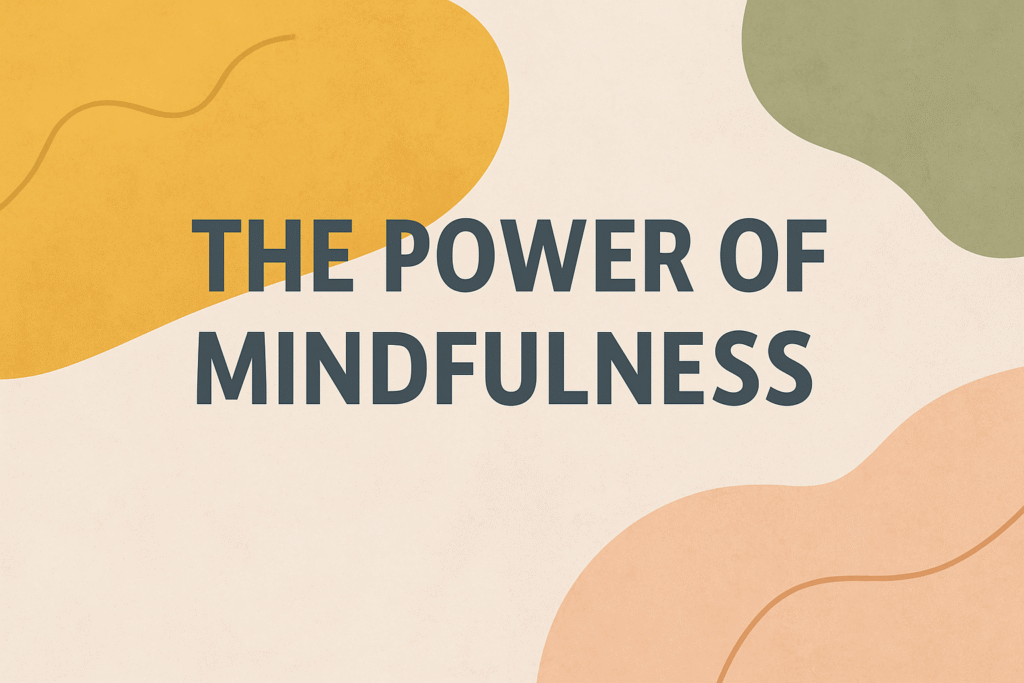
It’s a fast-paced world we live in, and it can be very easy to find oneself consumed by anxieties about the future or regrets over the past. And that’s where the idea of mindfulness comes in, possibly one of human history’s most ancient practices and equally relevant today. So let’s take a deeper look at what exactly mindfulness is, why it is so hot right now, and the science behind why we think mindfulness can change not only us, but society.
Mindfulness is one of those buzzwords you hear getting thrown around a lot, but I think that can make it tough to understand what it truly means. At its core, mindfulness is about being present — observing what’s happening in the moment and letting your thoughts and feelings pass through without judgment. The best part? Mindfulness doesn’t need to be complex or solemn! And there are plenty of ways to make your routine just a bit more mindful. For instance, you might begin your day by taking a few slow, deep breaths or savoring the flavors and textures in every bite of your next meal. These little moments can add up and help you stay grounded throughout the day.
What Is Mindfulness?
As already stated, mindfulness is about being “present”. Mindfulness invites us to let things be as they are without needing to fix them. In fact, we are encouraged to be non-judgmental toward our thoughts and feelings when meditating. It’s not about being right all the time; it’s about practicing to get better every time. Starting a practice of mindfulness is not difficult. Mindfulness can also be easily incorporated into your daily life and activities.
How Does Mindfulness Help?
At the same time, mindfulness can function as something of an elixir for your brain and cognitive functions. The first and most obvious way mindfulness assists us is that it helps to mitigate stress and anxiety. Learning how to use mindfulness to stay in the moment and relax our body and mind can help us not just survive, but thrive. Another thing I like about mindfulness is that it lets our brains take a break from the kinds of thought cycles we end up in. Mindfulness helps us be still in our minds while focused on the ever-present now. So much practice concentrating can actually make you more attentive and focused. This is because mindfulness can help us teach our brains to focus better.
Why Do People Embrace Mindfulness?
You can engage in mindfulness practice anytime — while driving, walking, or performing routine activities. Look around you and be mindful of five objects or details. This will help remind you to stay present. You can also try mindful eating by savoring each bite, practicing mindful walking, and focusing on your surroundings.
Mindfulness isn’t simply about being relaxed; it’s about having awareness of the moment, no matter what it represents. The more I practice, the more I stop to smell–and marvel at–the roses.1516
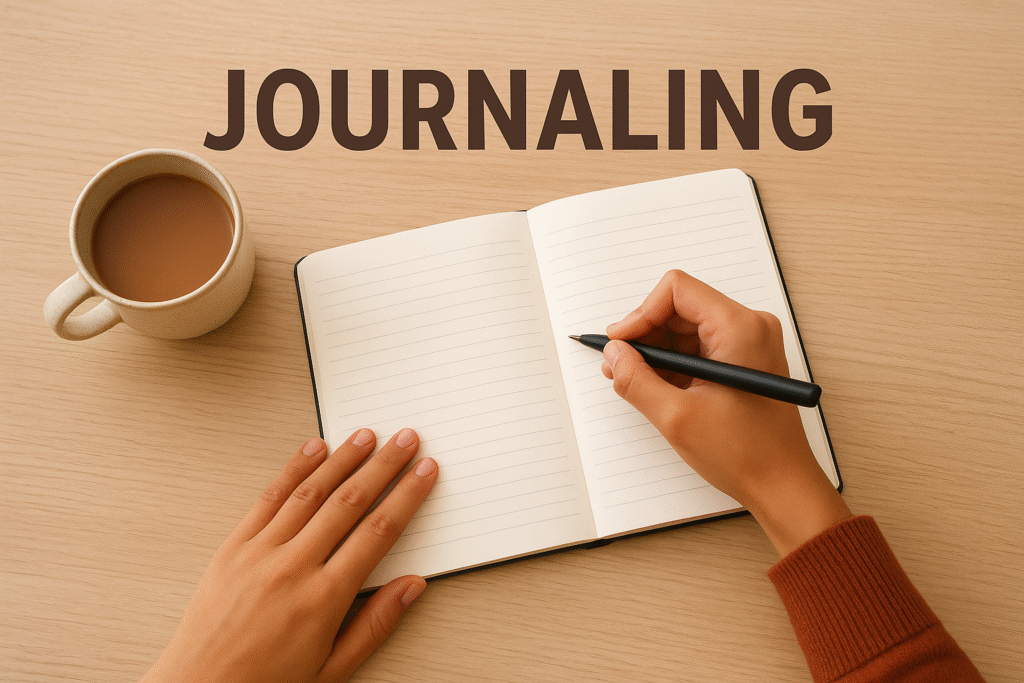
Expressing yourself by writing down your feelings or reflecting on where you are is very important. Even if you are not a writer, you might still find value in putting pen to paper. The key thing to remember with journaling is that there is no right or wrong way to journal. Journaling is less about the final product and more about the process. You don’t even need to have your life figured out or be a writer before you start journaling. Journaling is waiting for you when, and only when, you’re brave enough to give it a shot.
What Is Journaling?
Journaling can be any writing that seeks to articulate thoughts, ideas, challenges, or experiences. Whether you want to express gratitude, explore more about yourself, or reflect on personal goals, there are all sorts of things journaling can be good for. Journaling prompts exist for almost any subject if you are one of those people who have a hard time thinking of something to write about.
How Is Journaling Helpful?
Keeping a journal can also be an effective way of looking after our mental health, as it allows us to process our thoughts and emotions. Journaling provides the space to dump all that heavy stuff we carry on a regular basis. We gain insight when we record our thoughts and feelings, and if we see patterns or triggers. Even just jotting down how we feel can serve as a catalog of our progress toward our goals or areas we’re trying to improve.
Journaling Ideas
Occasionally, people feel blocked from journaling simply because they have no idea what to write about. People often hone the most beneficial ways to journal with practice. A few of the popular ways to journal are as follows:
Prompts: Use journal prompts to bring entry topics even more specifically. For example, if they wanted to work on increasing their confidence or struggling with self-confidence, part of the prompts were there to ignite just some of the underlying themes that maybe bring that up. Through these prompts, people can discover answers to questions they don’t even know yet.
Brain Dump: A type of brain dump is a substitute term for brain dump journaling, in which people jot down whatever thoughts are on their mind without worrying about coherence. This practice allows people to leave their thoughts and feelings in the journal and experience some release from them in the process.
Lists: If the thought of writing full sentences, let alone paragraphs, feels like an insurmountable demand right now, making a journal list should be something you consider. For instance, one could attempt writing a list of things currently causing stress or a list of the things for which they are grateful.
Journaling doesn’t have to “fix” anything in order for it to be beneficial. Journaling can feel therapeutic and grounding. Journaling works like venting to a friend, in a sense. You will generally feel better after, and you might even feel less lonely. Journaling is not about penning perfect paragraphs or deep poetry. It’s about figuring out the thoughts and feelings that may become knotted in our minds. Keeping a journal invites us to access the tools of writing to help ourselves through anything we are experiencing.171819
- Siegel, D. J., & Bryson, T. P. (2011). The Whole-Brain Child: 12 Revolutionary Strategies to Nurture Your Child’s Developing Mind. Delacorte Press. ↩︎
- Dweck, C. S. (2016). Mindset: The New Psychology of Success. Random House. ↩︎
- National Library of Medicine. (2022). The Effects of Early Trauma on Adopted Children. https://pmc.ncbi.nlm.nih.gov/articles/PMC8926933 ↩︎
- Raichle, M. E., et al. (2001). A default mode of brain function. Proceedings of the National Academy of Sciences, 98(2), 676–682. ↩︎
- World Health Organization. (2019). Burn-out an “occupational phenomenon”: International Classification of Diseases. WHO. ↩︎
- Jennings, P. A., & Greenberg, M. T. (2009). The prosocial classroom: Teacher social and emotional competence in relation to student and classroom outcomes. Review of Educational Research, 79(1), 491–525. ↩︎
- Porges, S. (2011). The Polyvagal Theory: Neurophysiological Foundations of Emotions, Attachment, Communication, and Self-Regulation. W. W. Norton & Company. ↩︎
- Kabat-Zinn, J. (2003). Mindfulness-based interventions in context: Past, present, and future. Clinical Psychology: Science and Practice, 10(2), 144–156. ↩︎
- Wolfelt, A. D. (2004). Understanding your grief: Ten essential touchstones for finding hope and healing your heart. Companion Press. ↩︎
- Craig, S. E. (2016). Trauma-sensitive schools: Learning communities transforming children’s lives, K–5. Teachers College Press. ↩︎
- Crosby, S. D. (2015). An ecological perspective on emerging trauma-informed teaching practices. Children & Schools, 37(4), 223–230. https://doi.org ↩︎
- McEwen, B. S. (2007). Physiology and neurobiology of stress and adaptation: Central role of the brain. Physiological Reviews, 87(3), 873–904. https://doi.org/10.1152/physrev.00041.2006 ↩︎
- Van der Kolk, B. A. (2014). The Body Keeps the Score: Brain, Mind, and Body in the Healing of Trauma. Penguin Books. ↩︎
- Creswell, J. D. (2017). Mindfulness interventions. Annual Review of Psychology, 68(1), 491–516. https://doi.org/10.1146/annurev-psych-042716-051139 ↩︎
- Kabat-Zinn, J. (2003). Mindfulness-based interventions in context: Past, present, and future. Clinical Psychology: Science and Practice, 10(2), 144–156. https://doi.org/10.1093/clipsy.bpg016 ↩︎
- Davis, D. M., & Hayes, J. A. (2011). What are the benefits of mindfulness? A practice review of psychotherapy-related research. Psychotherapy, 48(2), 198–208. https://doi.org/10.1037/a0022062 ↩︎
- Pennebaker, J. W., & Smyth, J. M. (2016). Opening up by writing it down: How expressive writing improves health and eases emotional pain (3rd ed.). The Guilford Press. ↩︎
- Wright, J., & Chung, M. C. (2001). Mastery or mystery? Therapeutic writing: A review of the literature. British Journal of Guidance & Counselling, 29(3), 277–291. https://doi.org/10.1080/03069880120073003 ↩︎
- Baikie, K. A., & Wilhelm, K. (2005). Emotional and physical health benefits of expressive writing. Advances in Psychiatric Treatment, 11(5), 338–346. https://doi.org/10.1192/apt.11.5.338 ↩︎